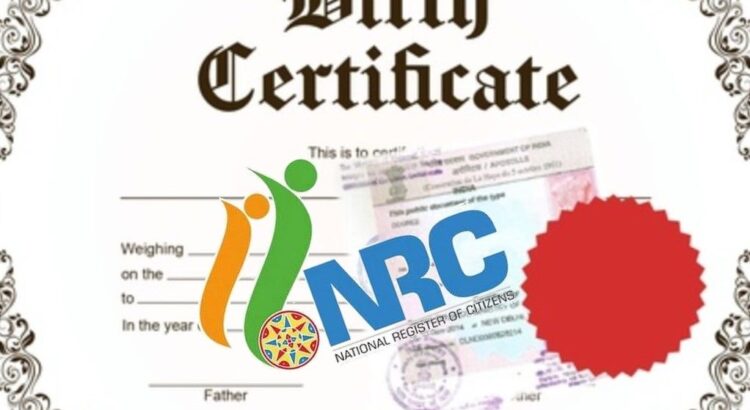The NRC is actually an official register that the Government of India maintains. It documents all who are legal citizens of this country. This implementation started in Assam so that all illegal immigrants can be identified nationwide.
In other words, this regime was triggered to identify “who are” and “who are not” the authentic citizens living in this country. This verification and documentation can be a valuable support for the government to determine who the actual recipient of government services and rights are here.
Role of the Birth Certificate in NRC
As far as the primary birth proof is concerned, a birth certificate comes first. The Registration of Births and Deaths Act, 1969, makes it mandatory to register the birth, recording the date, place, and parental details in it. In 2017, a Civil Registration System report stated an 84.9% registration rate because of its requirement.
Now comes the eligibility. Those who are born in India before July 1, 1987, automatically attain citizenship under the Citizenship Act, 1955. And those who are born after this date, their one parent must be an Indian citizen at the time of the child’s birth. Then he/she qualifies as a native. For this category, a birth certificate becomes substantial proof that confirms the birth and lineage.
But again, this is not the only document required as proof.
Other Acceptable Documents for NRC
Certain more proofs can be enclosed to prove one’s citizenship corresponding to the NRC guidelines, which can be the following:
1. Land or Tenancy Records:
- Any paper that shows the ownership or tenancy rights, which must be issued (before March 24, 1971 in Assam), can prove it.
2. Electoral Rolls:
- If your name is enlisted in electoral rolls before the cut-off date mentioned as proof of residency and citizenship, you are eligible.
3. Passport:
- In this case also, if a valid Indian passport is issued before the cut-off date, the passport holder is the citizen.
4. Educational Certificates:
- School leaving certificates or equivalent documents that state the place and date of birth can also be acceptable.
5. Government-issued documents:
- Government certificates like ration cards, Aadhar cards, LIC documents, and voter ID cards can also be accepted as supporting documents.
6. Refugee Registration Certificate:
- Those who migrated under specific circumstances can submit their refuse registration certificates as a valid proof.
7. Affidavits:
- In case of having no aforesaid primary proofs, an affidavit with the signature of a magistrate may be acceptable with other valid proofs.
Challenges with Birth Certificates and Alternative Proofs
Let’s discover who may face challenges to prove their citizenship.
1. Lack of Universal Birth Registration
People residing in rural India remain cut off from government facilities. A majority of those people do not have it. According to UNICEF, only 86% of birth cases were registered in 2019 across the globe, where some Indian states were at the bottom of its list.
2. Dependence on Legacy Data
Legacy data is the historical record that confirms the family lineage of an individual. Those who are enlisted will be automatically eligible for NRC registration. And the filtered names can apply for their citizenship through their family ties. But it’s not easy, especially for Assamese because the government there prioritizes legacy data.
3. Variability in Documentation
With multiple states, India has diverse historical records. This diversity ensures that a variety of documents for NRC are acceptable. In all, this provision acknowledges India’s diverse practices of documentation.
5. Legal and humanitarian considerations
Despite these documents, many contradictions emerged. These contradictions are stated below:
· The Citizenship Act, 1955
Despite being crucial, this Act does not mandate that a birth certificate is treated as a sole proof of citizenship. The applicant can show other papers, such as descendent papers, birth registration documents, and the certificate of naturalisation. This acceptance shows flexibility integrated in the NRC documentation process.
· Supreme Court Rulings
The Apex Court of India, i.e., the Supreme Court, has advocated to embrace fair practices to verify citizens. Many rulings passed; for example, the case of Sarbananda Sonowal vs. Union of India (2005) highlighted that there must be a balance between national security and individual rights.
· Human Rights Concerns:
The exclusion of vulnerable populations can be possible because of stringent documentation requirements. Organisations like Amnesty International and Human Rights have raised a question in this matter. According to them, a range of documents may marginalise groups, which is not a fair practice. In Assam only, 40 lakh people were marginalised under it. It’s a concern.
Conclusion
A birth certificate is a vital document and proof of one’s citizenship under the NRC. But some more supporting papers are also there that the government has recognised. The list has been shared above with use cases. However, the evolution is still on. The NRC framework has complexities. With legacy data, educational certificates, or affidavits, this complexity can be surpassed.











